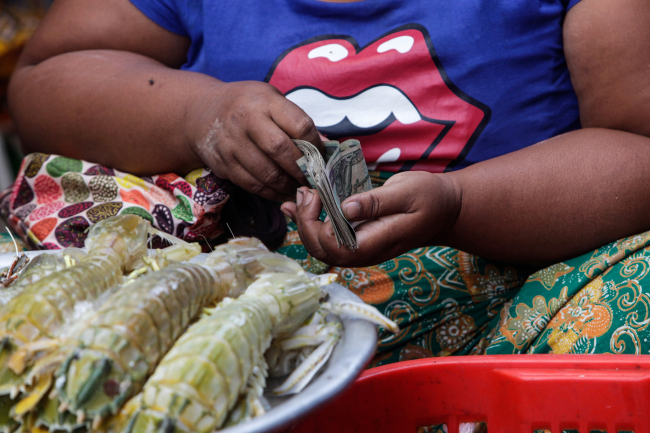In Myanmar, people have strong religious faith. On weekends and even weekdays the major pagodas in Yangon are often packed with worshippers praying for a better life.
Myanmar is also famous for its fortune-tellers. Their supposed occult powers made headlines here when then-Prime Minister Thaksin Shinawatra reportedly consulted a famous Burmese soothsayer. For believers, fortune-tellers can offer clues on how and when to act in order to increase personal prosperity.
Yet despite their prominence, Myanmar remains one of the poorest countries in the world.
According to the United Nations, Myanmar’s per-capita income was just $1,144 in 2011, the last time it was measured, though that was a huge improvement on the $258 in 2005.
Myanmar is also famous for its fortune-tellers. Their supposed occult powers made headlines here when then-Prime Minister Thaksin Shinawatra reportedly consulted a famous Burmese soothsayer. For believers, fortune-tellers can offer clues on how and when to act in order to increase personal prosperity.
Yet despite their prominence, Myanmar remains one of the poorest countries in the world.
According to the United Nations, Myanmar’s per-capita income was just $1,144 in 2011, the last time it was measured, though that was a huge improvement on the $258 in 2005.

With its 7-8 percent economic growth rate in the past two years, Myanmar’s per-capita income should have reached around $1,300 in 2013, which would earn it a place among the likes of Togo, Guinea and Eritrea near the bottom of the World Bank’s income rankings, which don’t yet include Myanmar.
And after this year’s census, the first in 30 years, Myanmar’s per-capita income is expected to rise even more, given that the actual population is likely to fall millions short of the current 60-million estimate. And the ongoing economic boom should do more to raise the figures in the years to come. Hotel occupancy rates are now near 100 percent, boosted by companies sending in executives to observe the just-opened market. During my trip to Yangon last week, Kobsak Pootrakul, an executive of Bangkok Bank, one of among nine foreign banks awarded local licenses, told me that during the last three years he had made about 15 visits to the country.
Thai ambassador to Myanmar Pisanu Suvanajata was also bullish on the country’s economic prospects and was seriously concerned that reluctant Thai companies may miss the train.
But this optimism has so far apparently failed to deliver a better life for most Myanmar citizens.
Those with good English are in a better position ― like “Zaw” who earns about $1,000 a month working at the Thai embassy. That is a staggering amount when you consider that 600 kyats (60 cents) will buy you a bowl of noodles on the street and that the annual minimum wage is $401.
Does the extremely low income level reflect a lack of faith among the people or a failure to listen properly to fortune-tellers’ advice?
I doubt it. Donation boxes scattered across pagodas in Yangon are stuffed full of banknotes, reflecting a popular belief in making merit for a better future.
One famous local fortune-teller, who predicted that opposition leader Aung San Suu Kyi would become the next president, said that he is kept busy by both locals and foreigners seeing his services. Each day he reads palms for about 30 clients. I watched him tell one she would definitely get married within the next 12 months. He gave another the exact auspicious dates she should start a business partnership.
But the persisting poverty in Myanmar prompts the question of what it is that really guarantees people’s prosperity in a country.
I guess it starts with basic public services, chiefly education and health, as well as improved equality.
On education, a local guide I spoke to was proud of her country’s system, which requires that students use English-language textbooks. After majoring in English, she said she has since had to learn Thai as Thai visitors often have trouble understanding English.
In interviews with multinational companies’ executives, however, a different story emerges. All told me that it is difficult to find skilled labor in Myanmar. A large and prestigious Polish university is having a similar problem recruiting Myanmar graduates for its master’s degree courses. The university representative told me that the candidates understand English texts well but they have trouble participating in discussions ― which is a key part of any master’s course. Dozens of them are now required to attend a yearlong course before making the trip to Poland.
Another thing that helps ensure prosperity is connections. We all know that cronyism is rampant in the economies of the developing world. Knowing people in high places guarantees that business flows in your direction.
A recent World Bank study of Egypt’s medium-size and large firms found that those with political connections made 60 percent of all the profits in 2010, yet provided only 11 percent of private-sector employment. It would be interesting to see the results of a similar study on Myanmar. Despite the government vowing to pursue democracy, media reports still show evidence of the cronyism that featured so prominently during the junta years.
What’s happening in Myanmar recalls the sobering words of German thinker Friedrich Nietzsche: “A casual stroll through the lunatic asylum shows that faith does not prove anything.”
In other words, neither faith nor fortune-telling is any good. Prosperity depends on concrete and sustained actions to build a future that is in the national interest, not in the interest of the few.
By Achara Deboonme
(The Nation)



![[AtoZ into Korean mind] Humor in Korea: Navigating the line between what's funny and not](http://res.heraldm.com/phpwas/restmb_idxmake.php?idx=644&simg=/content/image/2024/04/22/20240422050642_0.jpg&u=)
![[Exclusive] Korean military set to ban iPhones over 'security' concerns](http://res.heraldm.com/phpwas/restmb_idxmake.php?idx=644&simg=/content/image/2024/04/23/20240423050599_0.jpg&u=20240423183955)



![[Graphic News] 77% of young Koreans still financially dependent](http://res.heraldm.com/phpwas/restmb_idxmake.php?idx=644&simg=/content/image/2024/04/22/20240422050762_0.gif&u=)
![[Herald Interview] Why Toss invited hackers to penetrate its system](http://res.heraldm.com/phpwas/restmb_idxmake.php?idx=644&simg=/content/image/2024/04/22/20240422050569_0.jpg&u=20240422150649)





![[Exclusive] Korean military to ban iPhones over security issues](http://res.heraldm.com/phpwas/restmb_idxmake.php?idx=652&simg=/content/image/2024/04/23/20240423050599_0.jpg&u=20240423183955)



![[Today’s K-pop] Ateez confirms US tour details](http://res.heraldm.com/phpwas/restmb_idxmake.php?idx=642&simg=/content/image/2024/04/23/20240423050700_0.jpg&u=)